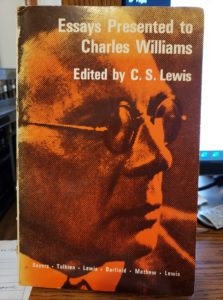
With C.S. Lewis being on of my favorite authors, I never pass up an opportunity to add something he’s written to my library. Some time ago I found a paperback titled Essays Presented to Charles Williams, edited by C.S. Lewis, in a used book store. Needless to say I snatched it up. Having within the last year finally finished Mere Christianity after several previous failed attempts, I went to the bookshelf in the storeroom, hoping I would easily find this 145 page volume there, and sure enough it was right where I thought I remembered it to be.
The premise of the book was to honor Charles Williams, a member of the Oxford Inklings, the author critique group formed by Lewis and J.R.R. Tolkien. While Lewis and Tolkien were academics at Oxford, some others in the group weren’t. Lewis read one of Williams’ novels and liked it so much he wrote to him. At the same time, Williams, in his duties at the Oxford University Press, had just read Lewis’ The Allegory of Love, loved it, and was ready to write to Lewis. Mutual admiration of the other’s writings was the start of this friendship.
Lewis invited Williams to come to Oxford from London and visit the Inklings. He did so, and visited on occasion from 1936 to 1939. The outbreak of World War 2 caused the Oxford Press to temporary relocate from London to Oxford, at which time Williams became a regular member of the Inklings.
In 1945, as the war was ending, Lewis wanted to honor his friend and talked about putting a book of essays together, a typical way of doing honor in the literary world of that time. Alas, Williams died suddenly in 1945 before the project really started. Lewis persisted, however, and the book came together and was published in 1948. My paperback was the 4th printing, published in 1977.
Those contributing essays were Dorothy Sayers, Tolkien, Lewis, Owen Barfield, Gervase Mathew, and Lewis’ brother Warren. All except Sayers were part of the Inklings (well, Barfield not so much as he was based in London, but he was there occasionally and was a good friend of all of them).
The essays were literary in nature. Sayers’ “…And Telling you a Story”, Tolkien’s “On Fairy-Stories”, and Lewis’ “On Stories” are obviously about literature, specifically on story-telling. Barfield’s “Poetic Diction and Legal Fiction” fits in that category. Gervase’s “Marriage and Amour Courtois…” fits as well. Warren Lewis’ “The Galleys of France” doesn’t quite fit in with the others. It’s about what he learned from his research into 16th and 17th Century France, which was the topic of his writings.
Each of the essays I found to be a bit tedious, Warren and C.S. Lewis’ the least so, Tolkien’s the most (also the longest). In fact, I couldn’t get through Tolkien’s essay. I struggled with it, reading a few pages a day, reading slowly, trying to capture what Tolkien wanted to communicate. Alas, I finally gave up and skipped the last ten pages of 52-page essay and went on to the others. This is true of all of Tolkien’s writings for me. I have never completed reading The Lord Of The Rings due to how difficult I find it. I have The Sillmarillion waiting for me to get to, but I’m not excited about it.
Excited about getting to a book. That was my feeling when this finally popped to the top of my “reading pile”. It didn’t fulfill my expectations. Perhaps it’s because of the distance in time and space between 1948 England and 2019 United States. Perhaps it’s the academic nature of the essays. Perhaps it’s just that these authors knew what their friend would like and wrote in that way. Whatever it was, the book disappointed to some extent.
Don’t get me wrong. I’m glad I bought the book, glad I read it, and will gladly give it a place in my permanent library. But, was this the best use of my valuable reading time? Perhaps not. Still, I can see myself going back to this a decade hence, re-reading it from cover to cover, somehow drawing meaning from Tolkien’s essay and finishing it, gaining more insight from the others on a second read. Maybe in those ten years I’ll make another post and you’ll get to read all about it.